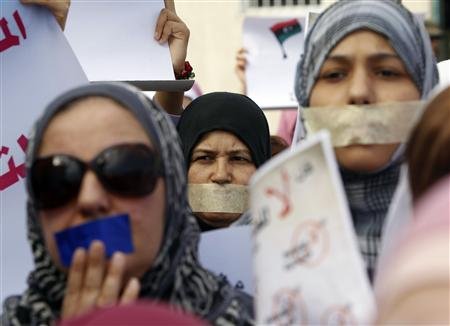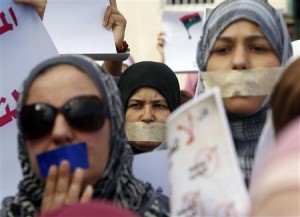


 The young woman introduced as “The Revolutionary” was breaking a taboo in Libya by speaking out about how she and other women had been raped by Muammar Gaddafi’s men in the early months of the country’s uprising.
The young woman introduced as “The Revolutionary” was breaking a taboo in Libya by speaking out about how she and other women had been raped by Muammar Gaddafi’s men in the early months of the country’s uprising.
“They arrested me publicly at Nasser University,” she said, recalling how guards in Tripoli came for her and two other young women who expressed support for the revolution that led to Gaddafi’s overthrow.
“They told me, ‘We are only going to take you away for questioning, and then we will bring you back’.”
Instead, the young woman said, a local official told the men: “Take these girls to Mutassim and enjoy them tonight.” Mutassim was one of Gaddafi’s sons and a military commander in the capital; he was later captured and killed.
The two unmarried women were taken away and never seen again. The Revolutionary, who was married and pregnant, was taken to a prison near Tripoli, where she was stripped and raped. She miscarried in prison, she said.
The three victims’ crime had been to criticize Gaddafi in a video clip broadcast on an international television channel. Many people, male and female, were raped as punishment for opposing Gaddafi’s government, but The Revolutionary is one of the few who agreed to talk about her suffering.
In Libya, rape victims are often ostracized, and discussion of the crime remains taboo. There are small signs of change, with the government promising action to help victims, but the issue remains so sensitive that aid groups sometimes hide their efforts to help victims to avoid causing an outcry.
The Revolutionary, a woman in her 20s, spoke on condition of anonymity from behind a black veil, only her eyes showing. With the pain of recollection, her voice gradually rose to a shrill pitch.
“They (our captors) wanted to insult us and to take away our dignity,” she said. “The youngest girl there was 14; the oldest was my mother’s age. The women were stripped and subjected to all kinds of torture.”
The torture included electrocution, she told a conference session attended by Reuters. She gave her account at a hotel in Tripoli as part of an event earlier this year organized by the Libya Initiative, a project that brings together various rights groups to promote healing and a just society in post-war Libya.
“Imagine how many women put up with this. It should be recognized,” she said. “But the country is not paying attention to any of these criminals. Maybe they are outside now, standing guard at checkpoints.”
Campaigners say it is important to acknowledge the crimes committed during Gaddafi’s 42-year rule and the revolution that led to his downfall in 2011. They say the painful process is “necessary for stability and the construction of a society based on truth, justice and democracy”.
Souad Wheidi, an activist creating an archive of the sex crimes committed during the revolution, stood next to The Revolutionary as she addressed the conference, comforting her when the girl broke down as she reached the end of her story.
The activist has campaigned for government action and such efforts appear to be having an effect.
Shortly after the Tripoli meeting, the Libyan prime minister proposed a new law to recognize rape and the need for resources to be allocated to victims as a matter of urgency.
“At last, it is a major victory,” said Wheidi, who is confident the law will be passed. “It will bring huge psychological relief after years of stupid injustice against the many people, both male and female, who have been touched by this reality.”
FACING UP TO RAPE
The victims of rape during Libya’s uprising may number in the hundreds, according to the International Criminal Court, which has collected evidence that forces loyal to Gaddafi used rape as a weapon to spread fear among the opposition.
Of all the crimes committed during Gaddafi’s rule and the revolution, rape is perhaps the most difficult to address because so few are willing to testify about it.
There are good reasons for this; victims who speak out risk being shunned or even killed by their families. Human Rights Watch notes that even after the war, a number of centers in Libya continue to provide havens for women “for no other reason than that they had been raped, and were then ostracized for ‘staining their family’s honor'”.
Victims are also reluctant to come forward because bringing a charge of rape to a Libyan court may be seen as an admission of having had unlawful sex. A rape claim can even result in the victim being prosecuted.
The prevailing, dismissive attitude to rape is reflected by a government ministry set up to support victims of the civil war; it has never offered any help to rape victims. The ministry said such aid was beyond its remit, which is to search for missing people and support families of those killed in the war.
The head of Libya’s human rights commission, congress member Amina Al-Mghirbi, said a draft of a new law to help rape victims was “almost ready”. She added: “It will be approved as soon as possible and contain compensation for treatment as well as settlements.”
In the absence of government support, a number of local groups have pursued their own initiatives. One project is led by Bahiya Kanoun, who escaped from Libya during the revolution after she was branded an enemy of Gaddafi for feeding information from the wives of military men to rebels in the east of the country.
Kanoun began working in refugee camps set up in Tunisia, where thousands of other Libyans fled during the fighting. Kanoun’s training in psychology and her Libyan origin put her in the rare position of being able to help rape victims. Clinics at the camps started calling her in regularly.
One of the privileges Libya can afford – thanks to pumping 1.6 million barrels of oil a day – is to send thousands of students to university abroad on higher education scholarships or business courses. Kanoun wants the government to place rape victims in these existing sponsorship programs – without revealing what happened to them to anyone, including their families.
Part of the reason Kanoun, who comes from a prominent Libyan family, hopes to succeed is her credibility with the government. She briefly served as a deputy minister of social affairs before deciding she preferred to work independently.
To promote her ideas, Kanoun met Libya’s Minister of Higher Education with a colleague, Maria Nicoletta Giada, who is president of Ara Pacis Initiative, an organization dedicated to conflict prevention and resolution that is backed by the Italian foreign ministry. Both women said the minister’s response was encouraging.
But Giada cautioned that the road from promises to implementation on a significant scale would be long. “We will have to see if his words translate into actions,” she said.
OVERCOMING TRADITION
In Tripoli, it is still difficult to offer social services to women, much less advertise them. Another group, Phoenix Libya, is experimenting with ways to protect women from violence under the guise of other forms of assistance.
It advertises economic support, like classes in English or marketing, and activities for children. But its underlying aim is to give help to women who either have been, or are, subject to abuse of one form or another – without agitating their husbands or fathers, who may even be the perpetrators.
“It’s difficult to build trust. There’s no culture of speaking out,” said Ibtihat Nayed, one of the founders. “We don’t advertise psychological or social support. We are trying to be discreet about that.”
Women’s rights groups say the attitudes of ordinary men are a greater obstacle to helping women than government inertia in a country where many women have to answer to male relatives.
Amnesty International, along with other international organizations involved in Libya during the eight-month civil war that ended Gaddafi’s 42-year rule, said it had not documented a single case of rape because victims would not speak out.
“We think (multiple rapes) might have happened but do not have any evidence,” said Amnesty International. “Everyone said, this happened, but not in our town. It was in the town next door.”
-Reuters






